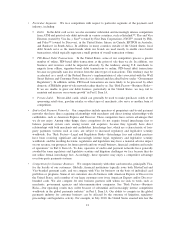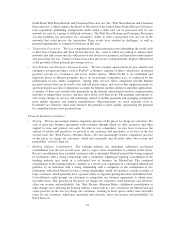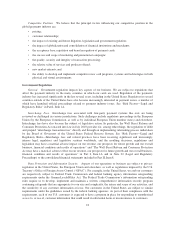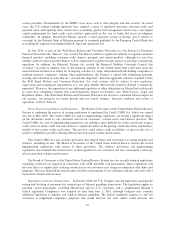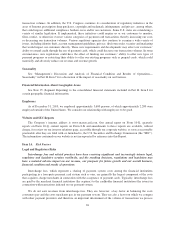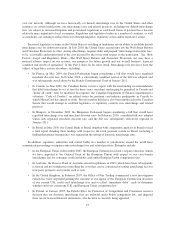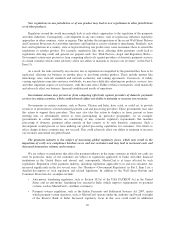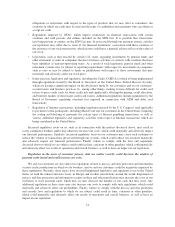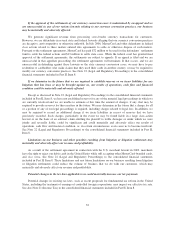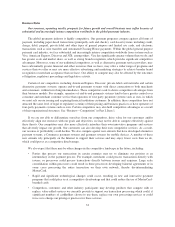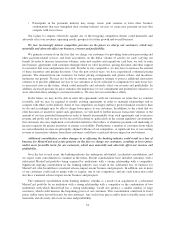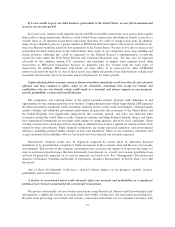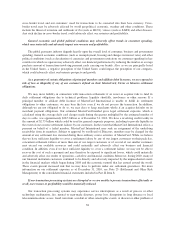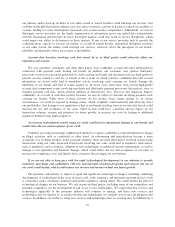MasterCard 2010 Annual Report Download - page 39
Download and view the complete annual report
Please find page 39 of the 2010 MasterCard annual report below. You can navigate through the pages in the report by either clicking on the pages listed below, or by using the keyword search tool below to find specific information within the annual report.industry practices. Among other things, it requires debit and prepaid “interchange transaction fees” (referred to in
the Wall Street Reform and Consumer Protection Act as fees established, charged or received by a payment card
network for the purpose of compensating an issuer for its involvement in an electronic debit transaction) to be
“reasonable and proportional to the cost incurred by the issuer with respect to the transaction.” Proposed
regulations by the Federal Reserve provide two alternative proposals for determining whether a debit interchange
fee complies with the “reasonable and proportional” standard. One alternative would impose a range for a
per-transaction interchange fee and the other would impose a simple cap. In each case, the Federal Reserve’s
proposed debit interchange limits are significantly below the interchange fees card issuers currently receive.
Provided certain conditions are met, the proposed regulations exempt from the proposed interchange fee
restrictions the following: (1) issuers with assets of less than $10 billion; (2) debit cards issued pursuant to a
government-administered program; and (3) general use prepaid cards not marketed or labeled as gift cards. Also,
while the proposed regulations do not directly regulate network fees, they make clear that network fees cannot be
used to circumvent the debit interchange fee restrictions. See “Risk Factors—Legal and Regulatory Risks—
Interchange fees and related practices have been receiving significant and increasingly intense legal, regulatory
and legislative scrutiny worldwide, and the resulting decisions, regulations and legislation may have a material
adverse impact on our revenue, our prospects for future growth and our overall business, financial condition and
results of operations” in this Part I, Item 1A.
Additionally, the Wall Street Reform and Consumer Protection Act provides that neither an issuer nor a
payment card network may establish exclusive debit network arrangements or inhibit the ability of a merchant to
choose among different networks for routing debit transactions. Under alternative rules proposed by the Federal
Reserve, either (1) a debit card would meet the requirements of the Wall Street Reform and Consumer Protection
Act as long as it could be used in at least two unaffiliated networks, or (2) each debit card would be required to
function in at least two unaffiliated networks for each method of authorization that the cardholder could use for
transactions (i.e., two signature and/or two PIN networks).
The Wall Street Reform and Consumer Protection Act also created two new independent regulatory bodies
in the Financial Reserve System. The Bureau will have significant authority to regulate consumer financial
products, including consumer credit, deposit, payment, and similar products, although it is not clear whether and/
or to what extent the Bureau will be authorized to regulate broader aspects of payment card network operations.
The Council is tasked, among other responsibilities, with identifying “systemically important” payment, clearing
and settlement systems that will be subject to new regulation, supervision and examination requirements,
although it is not clear whether MasterCard would be deemed “systemically important” under the applicable
statutory standard. If MasterCard were deemed “systemically important,” it could be subject to new risk
management regulations relating to its payment, clearing, and settlement activities. New regulations could
address areas such as risk management policies and procedures; collateral requirements; participant default
policies and procedures; the ability to complete timely clearing and settlement of financial transactions; and
capital and financial resource requirements. Also, a “systemically important” payment system could be required
to obtain prior approval from the U.S. Board of Governors of the Federal Reserve System or another federal
agency for changes to its system rules, procedures or operations that could materially affect the level of risk
presented by that payment system. These developments or actions could increase the cost of operating our
business and may make payment card transactions less attractive to card issuers, as well as consumers. This
could result in a reduction in our payments volume and revenues.
If issuers, acquirers and/or merchants modify their business operations or otherwise take actions in response
to this legislation which have the result of reducing the number of debit transactions we process or the network
fees we collect, the Wall Street Reform and Consumer Protection Act could have a material adverse impact on
our revenue, our prospects for future growth and our overall business, financial condition and results of
operations. Failure by our customers or by us to adjust our strategies successfully to compete in the new
environment would increase this impact.
29




